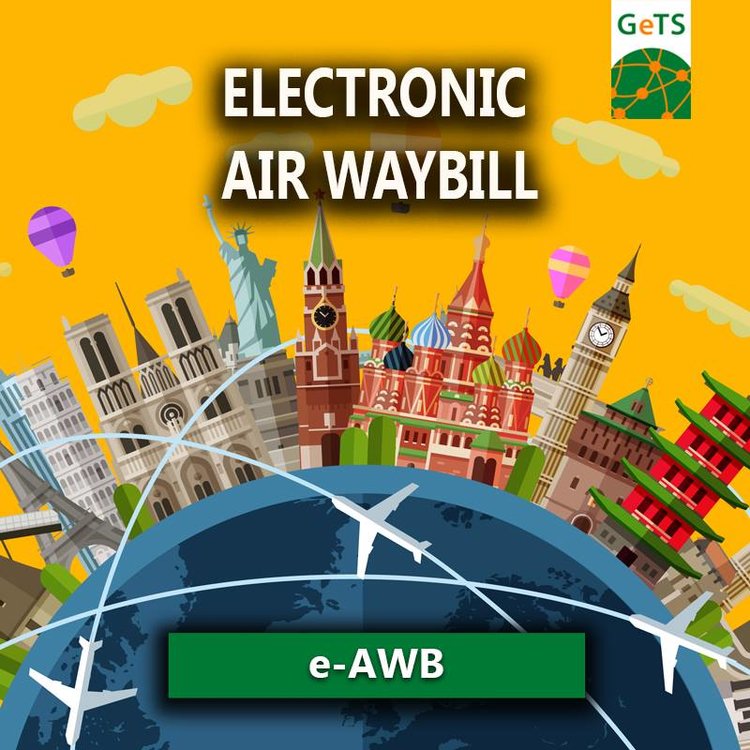Table of Contents
-
What is eAWB?
-
eAWB in Latin America
-
Latin American Air Cargo Compliance with eAWB Solutions from GeTS
Job Scam Alert:
This is to notify you that we have been alerted of job scams misusing the name of Global eTrade Services (GeTS). We would like to emphasize that there is no active, ongoing recruitment under the brand name of GeTS as we now operate under our parent company, CrimsonLogic. Please read the full disclaimer here.
Table of Contents

International air cargo can involve more than 30 different paper documents, of which the air waybill is the most critical. The electronic air waybill or eAWB is the online version of the paper master air waybill that serves as a contract of carriage for international air freight shipments. The eAWB is also used as evidence of receipt of goods, as a freight bill, as certificate of insurance and supplementary document for customs clearance.
eAWB is an industry-wide initiative by the International Air Transport Association (IATA) to replace and streamline paper processes. International air carriers, freight forwarders, ground handling agents and other air cargo participants are switching from labor and time-intensive manual processes to paperless electronic communication, and service providers are helping ease the transition to e-freight.
The eAWB is a game changer in an industry where paper documentation has been the norm since the beginning of air cargo. Unlike paper air waybills, the eAWB improves speed, accuracy and transparency. Cargo data comes straight from a computer system, allowing agents to make last-minute changes to the information in real time right up until the cargo arrives at its destination.
The eAWB cuts down on the mountain of paperwork that the air cargo industry produces every year. Switching to electronic reduces the environmental footprint of businesses and communicates their green commitment to customers. Businesses also save money by reducing costs associated with paper-based air waybills—from the cost of paper to printing and storage.

Freight forwarders or authorized agents are responsible for preparing export documentation for air cargo shipments. After the customer/shipper requests a booking, the freight forwarder plans the shipment, confirms the booking, prepares the shipment for export, prepares documentation and transmits the eAWB to the air carrier.
Based on the IATA standard operating procedure, the shipment record ((X)FWB) must be created in the freight forwarder’s system or via a web portal. For shipments without accompanying paper documents, the forwarder must include Special Handling code “EAW.” For shipments with accompanying paper documents, forwarders must include Special Handling code “EAP.”
For “secured cargo” the e-CSD must be included in the Other Customs, Security and Regulatory Control Information (OCI) field of the (X)FWB. For consolidated shipments, house waybill data (XFZB/FHL) must contain the Security Status of each individual HAWB, including full shipper/consignee address when required by the final destination.
After receiving the eAWB, the carrier performs shipment acceptance checks before tagging the shipment “ready for carriage.” After preparing and loading the shipment, the carrier transmits the eAWB to the ground handling agent and applicable authorities.
To get started with eAWB, agents and freight forwarders must sign one document (a multilateral agreement created by the IATA). This allows access to multiple airlines in airports around the world. Alternatively, the airline’s eAWB bilateral agreement can be used. In addition, freight forwarders must be technically capable of sending out high-quality eAWB messages and processing other electronic messages: freight-on-hand, freight acceptance, acknowledgement and rejection. If you can already send digital freight waybill messages (FWBs), you’re good to go. If not, consider working with a third party logistics or IT service provides offering eAWB services.
Not all airlines and airports are ready to accept eAWBs. Before transmitting, check the list of eAWB-ready airlines using the IATA e-Cargo Matchmaker tool on the IATA website. To find out about the cost saving benefits of eAWB transmission in your country, check with the air carrier. Airlines usually send circulars to their customers mentioning manual vs. electronic submission charges.
As of March 2018, worldwide eAWB penetration vs. paper is at 53.1 percent. IATA data shows that Central and South America lags behind the global average in eAWB penetration, with just 29.2 percent of air waybills being processed electronically.
Despite low eAWB penetration, the IATA showed a 7.2 percent increase in traffic reported by airlines based in Latin America in 2017. The increase was due to improvements in demand conditions for the region’s carriers and corresponding pick-up in Brazil, the continent’s largest economy. Given the long-term depression of Latin America’s market, last year’s growth rate was almost nine times its five-year average.
Analysts are hoping the uptick would turn into a trend, with carriers positioning themselves for a comeback and reporting market improvements. E-commerce is also exploding in Latin America, creating major opportunities for airlines, freight forwarders and logistics providers.
To leverage these new opportunities, Latin American air cargo participants must turn to technology. Those who are not yet using eAWB can make the transition to electronic as smooth as possible by working with a solutions provider like Global eTrade Services (GeTS). GeTS offers Spanish-language eAWB services to improve participation.

The GeTS eAWB solution allows air cargo participants to send electronic air waybills to carriers and authorized agents. More exporters can now process documents faster and achieve Latin American air cargo compliance with eAWB. Going electronic means quicker turnover of eAWBs between the freight forwarder and the airline and more efficient, secure and cost-effective processing.
GeTS eAWB is more than just a filing application. It is part of GeTS’ best-in-class, smart and sustainable air freight solutions. Clients can expect the following benefits when using GeTS eAWB:
Save money by reducing fees charged by airlines for eAWB transmission, reducing paper usage and associated costs and reducing labor and transport costs.
Save money by minimizing wait times at the airline.
Reduce the environmental impact of your business by reducing or eliminating paper documents.
Improve productivity with electronic printing and storage and by reducing delays due to missing or illegible paper AWBs.
Increase accuracy and data quality by preventing human errors.
Immediately connect to over 170 international airlines for quick global eAWB implementation.
Multiple eAWB transmission options: online and host-to-host direct system integration with existing software
It’s easy to get started. Simply register as an IATA cargo agent through IATA’s website, sign the IATA multilateral agreement on the IATA website, and register for a 30-day free trial at CrimsonLogic GeTS Air Cargo Connectivity website or download the eAWB customer registration form.
You can send your first eAWB in three easy steps:
1. The air cargo agent or freight forwarder at origin creates the Master Air Waybill (MAWB/FWB) through the GeTS e-AWB system.
2. GeTS eAWB auto-populates relevant data from your MAWB to House Air Waybills (HAWBs/FHLs). The air cargo agent or freight forwarder enters additional information required in the HAWB. Our system will automatically transmit your MAWB and HAWBs to the airline.
3. The airline automatically sends Freight Status Updates (FSU), including RCS (Ready For Carriage), to the agent or forwarder through GeTS eAWB. The status shows if the documents are received, 'Ready For Carriage' or accepted.
The GeTS eAWB solution features secure corporate accounts, 24/7 customer support, streamlined and easy-to-use application, report generation, advanced integration, and multiple plans and connectivity options. Out subscription options include web, fax and integration.
Web: Convenient access anywhere with Internet connection. Features template creation, full audit trail and reporting, and instant responses from airlines.
Integration: Integration with in-house systems with support for partial data transfer to web portal account for submission to airlines and support for multiple submission protocols (FTP, sFTP, SMTP AS2, Web Services).
Filing Services: Electronic processing of requests via fax or email, portal account access, and confirmation messages via phone, email or SMS.